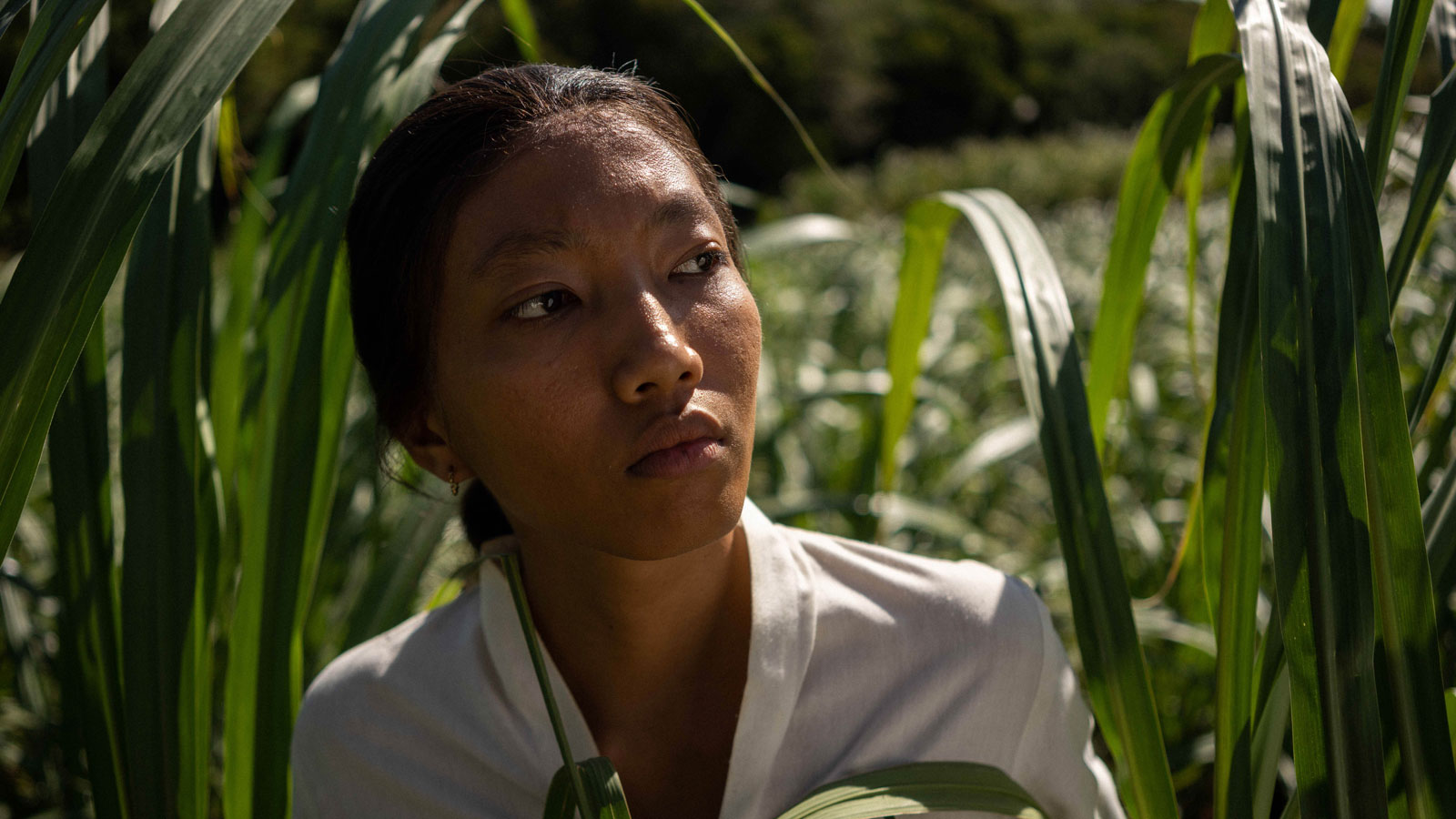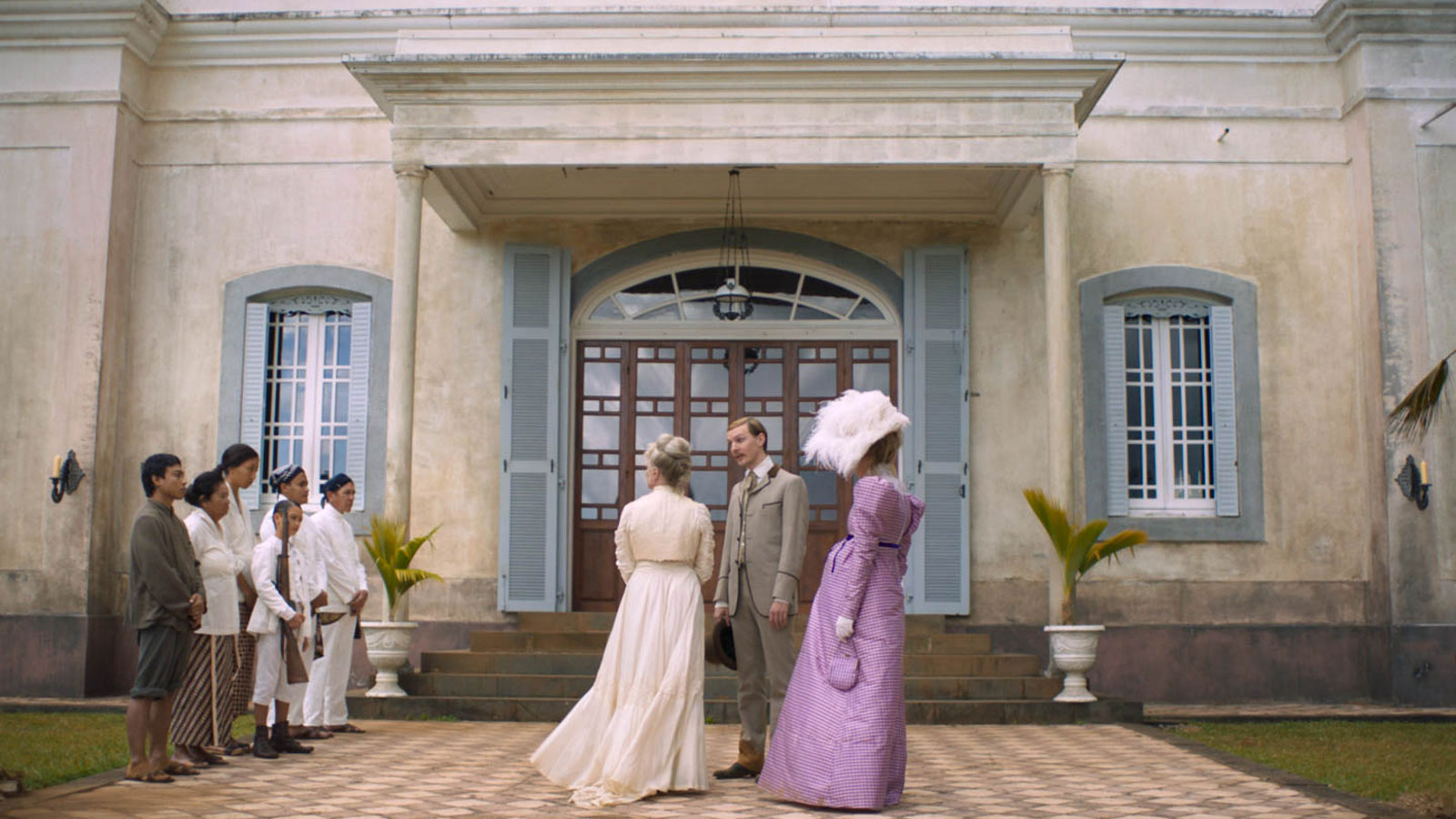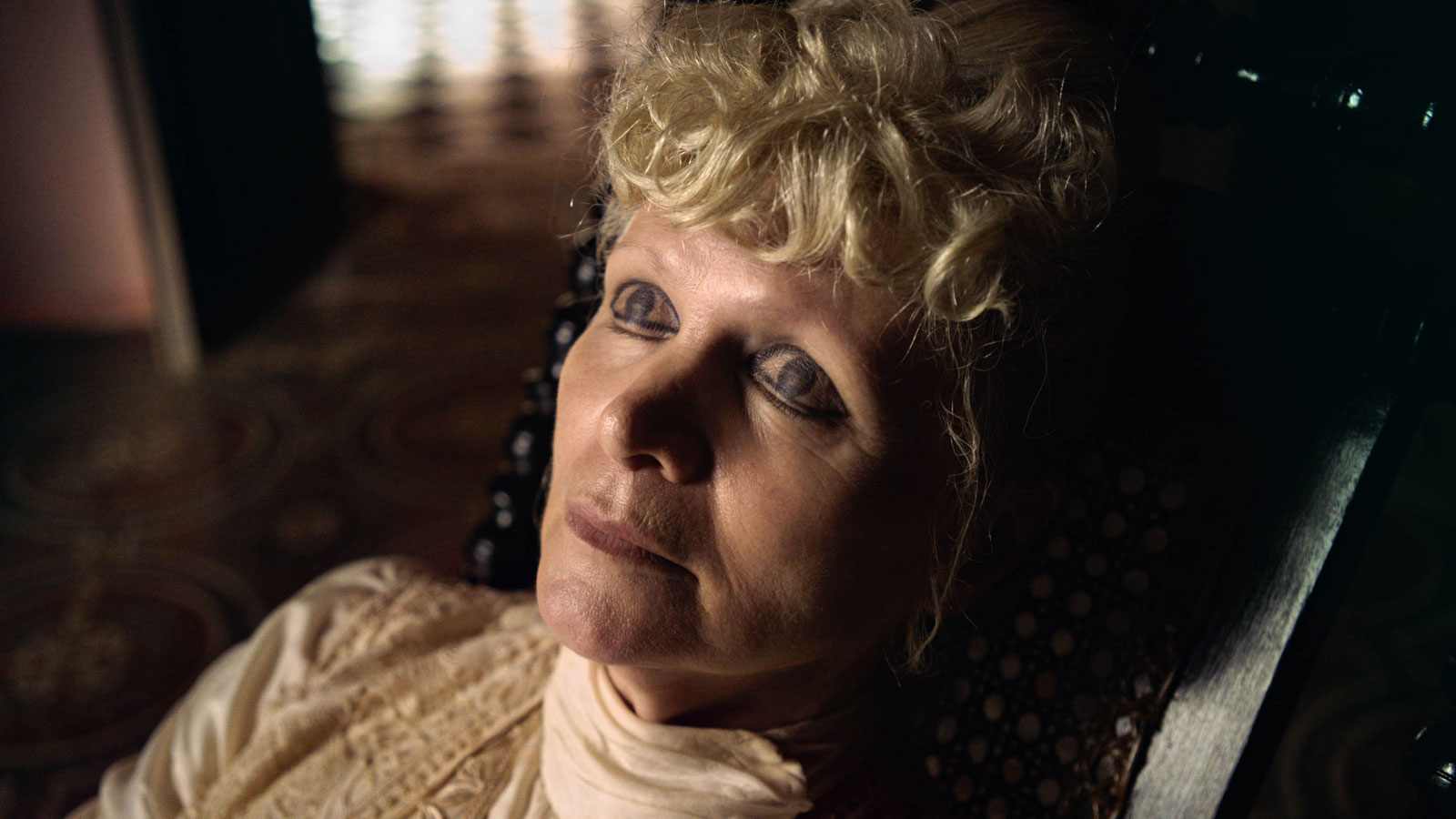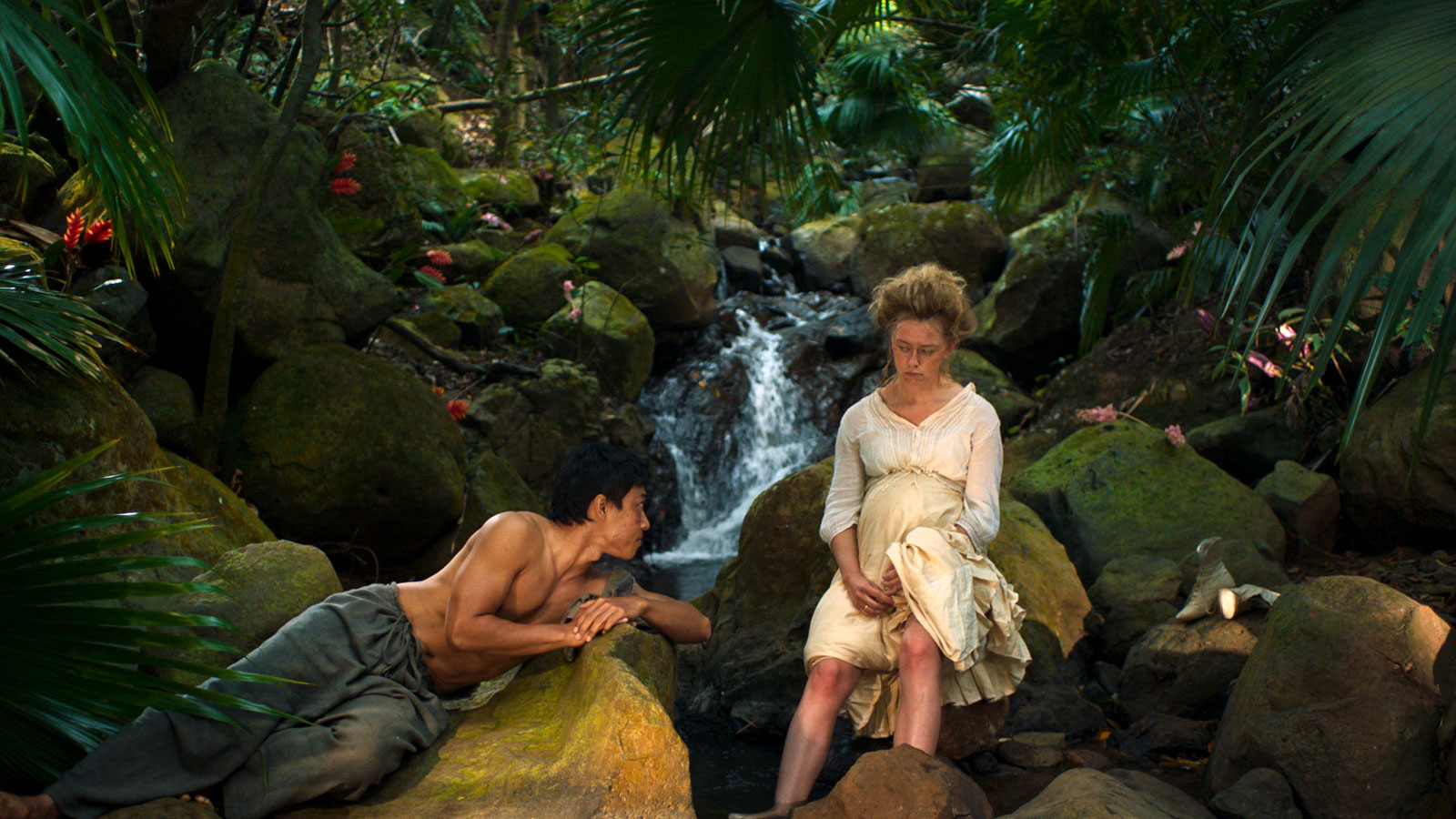Sweet Dreams – Four Ways

The live-editing workshop is an integral part of each year’s Critics Campus, and this year, four members of the cohort were assigned Ena Sendijarević’s acidic satire Sweet Dreams. After penning their reviews, the participants sat through an intensive revision session with editor, writer, speaker and dancer Adolfo Aranjuez. Read their final reviews below.
By Alice Bellette
Ena Sendijarević’s Sweet Dreams opens gliding above the vibrant green of steamy jungle treetops, the thick and humid air of the 1900 Dutch East Indies sugar plantation setting palpable. From the rich reds of the decadent colonial villa to the dark wood of the antique motifs that punctuate the composition of the frames, the film’s intentional use of colour and light evokes the artifice and construction of a diorama, underscoring the alien presence of the Dutch.
In an early scene during a parlour soiree, Siti (Hayati Azis) skirts the perimeter, dispensing top-ups from a large carafe. The Indonesian housemaid’s deadpan and silent disposition is sharply tuned to both the needs of the household and to the superficial politics that shape the guests’ relations; while she seems a passive observer, it is a façade that reveals itself as being more significant than it appears. Later that night, Siti dances at Jan’s (Hans Dagelet) request in an act of foreplay, her shadow cast upon the wall by the small flame inside the lantern on the floor. Upon returning to his bedroom, he is seized by cardiac arrest as his wife, Agathe (Renée Soutendijk), watches.
When Jan and Agathe’s son Cornelis (Florian Myjer) and his heavily pregnant wife, Josefien (Lisa Zweerman), arrive from the Netherlands, the film’s colours heave with a queasy violence. Expecting to close the plantation and return home with the wealth of the sale, Cornelis discovers that Jan has left the entirety of his estate to Karel (Rio den Haas), his illegitimate son with Siti.
The intense colour palette of the reds and greens of the interior walls magnifies the plantation setting. Its richness is a marzipan visual, confected from the geometric designs of the floor tiling. Agathe loads spoonful after spoonful of sugar into a dainty china teacup, foreshadowing her eventual fate. While sugar, as a substance and as a product, does not spoil, the colonial exploitation and extractivism of a people and a land as a dominating structure is one predestined to rot.
In a shot towards the end of Sweet Dreams, Siti is shown reflected in a cracked mirror. An image of a fractured self, it brings sharply into focus the number of characters she inhabits under the structures of her oppression. In this moment, she appears to understand the consequences that lie ahead for her son as a person displaced by colonial interference: in the Netherlands, he is an outsider, despite the birthrights of his patrilineage; but Karel is himself a product of colonial imposition.
As the film draws to its close, audiences are left to contemplate Karel and his future. Modern viewers have the benefit of hindsight to know of the global reckoning that lies ahead. Siti assures Karel that there is a place for him in Europe, where he is “from”, but Karel asks how he can be from a place he has never been. She may be unable to protect him from the duality of his place inside the walls of a decaying colony.

Sweet Dreams
By Grace Boschetti
On the final night of his life, Jan (Hans Dagelet), a Dutch patriot and sugar plantation owner, instructs his housekeeper and mistress Siti (Hayati Azis) to dance for him. Their young son, Karel (Rio den Haas), waits beneath their bed as they fornicate. Jan is saved the indignity of dying mid-thrust; instead, he succumbs, flailingly, upon returning to the bedchambers he shares with his unmoved wife, Agathe (Renée Soutendijk).
The visually splendid sophomore feature of Bosnian-Dutch filmmaker Ena Sendijarević, Sweet Dreams delivers on the promise of the director’s torrid debut film Take Me Somewhere Nice (2019). A period piece divided into distinct chapters and shot in the squarish Academy ratio by talented cinematographer Emo Weemhoff, Sweet Dreams presents an intriguing anachronism. Contemporality is built into Sendijarević’s stylised and irreverent approach, most prominently in the application of Martial Foe’s score.
The mountainous, lacy forests of Réunion stand in for Indonesia under Dutch colonial rule at the turn of the 20th century. Fittingly, the film’s characterisation of the European settlers tends towards overstated petulance. Sendijarević confines the sumptuously clothed aristocrats to oppressive, stuffy frames. Their pallor is contrasted with walls that are sunset orange, velveteen red and – most strikingly – a garish, sickly green.
The perpetually resting Agathe is afflicted with a palpable malaise. Perhaps it’s the years she’s been waited on hand and foot – a fundamentally unnatural way to live – or it may be the void of love in her life, which extends to her dealings with her pathetic, waxen son Cornelis (Florian Myjer), to whom she writes to take over management of the sugar factory.
The arrival of the latter and his pregnant bride, Josefien (Lisa Zweerman), opens Sweet Dreams’ second act. Sendijarević cleverly charts how the young woman, profoundly discomforted by her new environment and impotent husband, is rapidly infected by the indolence that so exhausts her mother-in-law. Eventually she can no longer bother even to swat at the mosquitoes that plague her relentlessly.
As familial tensions progress, Siti’s complex, sometimes inscrutable psychology becomes the film’s most compelling offering. Karel, the princeling of the isolated plantation, is accustomed to looking down at workers from the elevation of his monstrous father’s shoulders. Sendijarević makes clear that the boy is the product of his mother’s ambitions and her willingness to trample on others to further align herself with a people and infrastructure that she knows to be parasitic, and which will never recognise her as an equal.
Just as Sweet Dreams seems poised to decay into something caustic, another dance is demanded of Siti. Her performance is, as ever, guarded, but the hurt that blazes within can no longer be contained. Sendijarević reaches her hypnotic, dreamlike conclusion with an elegant restraint. It’s stirring and disarmingly effective.

Sweet Dreams
By Austin Lancaster
In the absurdist anticolonial comedy Sweet Dreams, the mosquito is a central motif. Set in the year 1900, Ena Sendijarević’s second feature takes place at a Dutch East Indies sugar plantation owned by a different kind of parasitic creature: a family of European colonists facing the end of their fragile reign. Living with them is their young Indonesian housekeeper, Siti (Hayati Azis), who experiences a dilemma when her ‘tramp’ lover, Reza (Muhammad Khan) – an ardent young man of her culture – asks her to run away with him. After Jan (Hans Dagelet), the family’s repressive patriarch, kicks the bucket in the midst of anticolonial unrest, his widow, Agathe (Renée Soutendijk), sends for help in the form of her man-child son, Cornelis (Florian Myjer), who arrives from Europe with his heavily pregnant wife, Josefien (Lisa Zweerman).
Also part of the family is Karel (Rio den Haas), Siti’s young biracial son, born of her obligatory “little dances” with Jan. Karel, first seen wearing a Dr Livingstone helmet on a hunt with his father, has something of a mixed loyalty, having inherited some of Jan’s entitlement as well as his fascination with rifles. When he and Cornelis come into conflict, a Most Dangerous Game ensues.
Shot by Emo Weemhoff, the film has a conspicuous palette, made up of emerald greens, incandescent candlelight, blood-red walls and moonlit midnight blues. The approach to lighting and make-up upends Hollywood’s historical pandering towards white skin: while Siti’s and Reza’s features tend to be sculpted in a warm glow, the Caucasians’ faces have a sickly sheen of orange and reddish hues. The interior composition, in which figures are captured in their decadent environment in wide angles, has a stiff doll’s-house quality; Cornelis’s waxy comb-over gives the impression of a toy figurine. This effect is enhanced by Martial Foe’s knowingly childlike score, with its mechanical music-box feel.
Sweet Dreams most comes alive when making potent irony out of the colonists’ moral and physical grotesquerie, their veneer of strained niceties stretched so thin as to be patently ridiculous. There are memorably witty sight gags: a letter signed off with a kind of stamp formed by spearing a mosquito with a pen nib; two ladies seen peering into a camera that appears to be located inside a dead tiger’s mouth. At times, however, the ironies play out so rigidly that the film tends somewhat towards the obvious. When a scene of sexual tension plays out between Josefien and Reza, the latter can’t help but laugh, as if only too aware of the exotic cliché.
At the film’s end, there is a feeling of something that has slipped by too easily, the final blaze of destruction strangely lacking in heat. For all the emotional and political violence that underpins the film, its schematic, easily digested construction works against its impact. Rather than leaving a painful bite mark on the viewer, the pain is quickly forgotten, like a dream that dissipates on waking.

Sweet Dreams
By Dylan Rowen
Dutch East Indies, circa 1900. A white sugar baron dies, leaving his plantation estate to his Indonesian son. A power vacuum opens up in the household of a Dutch family made rich through the exploitation of their Indonesian workers. In the ultra-stylised Sweet Dreams, Ena Sendijarević attempts a critique of colonisation, though the film’s glossy surface and deliberate artfulness instead manage to distance the audience from the reality of its horrors.
We follow the housemaid of the manor, Siti (Hayati Azis), and her son Karel (Rio den Haas), who has been named heir to the estate. But the other son, Cornelis (Florian Myjer), who returns from the Netherlands with his heavily pregnant wife, Josefien (Lisa Zweerman), plots Karel’s death in the hope of reinstating his inheritance. Throughout, the white characters note that they exist in a world in which ‘normal’ rules don’t apply. The weather, in particular, pushes back against the colonists – a stultifying and humid atmospheric pressure that actively rejects and attacks the white presence in the film. Slowly, we begin to see Josefien and Cornelis blister, burn and sweat in their fickle greed, their faces broken out in boils and pustules leaking fluid. Mosquitoes prick and drink heavily from them; bugs infect their food.
Sumptuously stylised and at times mesmerisingly surrealist, this film invites comparisons to Poor Things (Yorgos Lanthimos, 2023) with its use of fish-eye lens and elaborate period set design and costuming. Sendijarević plumbs from fin de siècle fashions that are then torn apart, soiled and undone by the wild and untameable Indonesian rainforest. All this, combined with the suffocatingly tight framing from director of photography Emo Weemhoff, reflects the straightening ideology of white colonial rule. Sometimes, though, the imagery can be too on the nose. The patriarch’s corpse seemingly disappears amid the tensions that arise within the family around the question of succession, calling into stark contrast the hollowness of European society, with all its decadence and empty, evil promises of cultivation and order.
When the film does veer into some semblance of unreality and surrealism, its beautiful imagery is undercut by some odd narrative and performance choices: actors burst into laughing fits, and character arcs are woefully underdeveloped. The script feels more suited to the stage than the screen. In parts, the film is too overproduced and glossy, and its imagery feels like something akin to a YouTube advertisement: oversaturated, and ultimately hollow.
Ena Sendijarević’s slow-burn feature doesn’t go anywhere in particular, and we are left strung out to dry in the rainforest. What should be a nightmare of colonialism instead lulls you into a deep slumber.